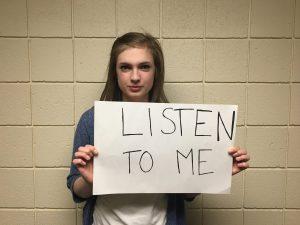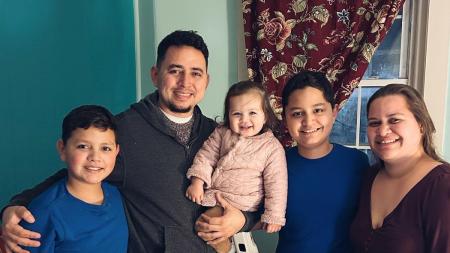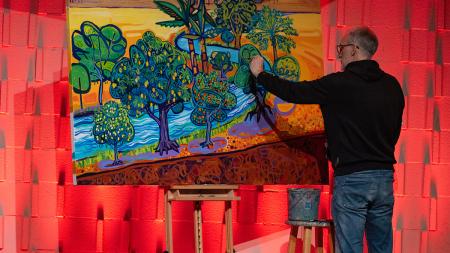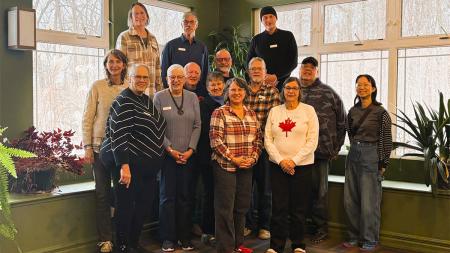Creating a 'Spark'’ between the Generations

Generation Spark blog
Observing the unprecedented numbers of young people rising up and protesting the gun violence that recently killed 17 people at a Florida high school, Virgil Gulker saw a powerful and yet disaffected spirit.
Program director of the Center for Leadership at Hope College, which is affiliated with the Reformed Church in America, Gulker said he saw young people who want to speak to older persons about their values, concerns, and fears. In this case, they want to change gun laws.
But there is something deeper and broader that Gulker sees in today’s youth. He said there is a widening gap between the generations — a yearning on the part of young people to be heard, especially in young people that he works with at the college in Holland, Mich., who are finding it increasingly difficult to remain in the churches that their fathers and mothers attend.
“There is a profound hunger of our youth — within schools and churches — to be heard and valued. . . . ‘The church doesn’t listen to us,’ they complain,” wrote Gulker in a recent blog on the website of Generation Spark, a new program now launching in a handful of Christian Reformed Church in North America and Reformed Church in America congregations.
“I wonder . . . when will disaffected youth stage walks-outs at their churches? Oh, wait,” Gulker continued, “they are already doing that, with 70 percent of them leaving churches every year.”
Generation Spark, said Gulker, is the result of a challenge his Center for Leadership made in 2014, asking high school and college students to research the steep decline in church attendance and religious affiliation among the millennial generation and adults who no longer affiliate with a church.
After sifting through their findings, they concluded that the chief reason for this exodus was, in most cases, the absence of any meaningful plan to involve youth with the church, its adult members, or its vision.
Rev. Joel Boot, retired executive director of the CRCNA, captured the urgency of this issue, said Gulker, with these words: “The pastors with whom I met over the years invariably opened the conversation with this question: ‘Joel, what are we going to do to keep our youth?’ This did not happen once or twice. It happened every time we met.”
With the help of a $458,000 grant from Lilly Endowment Inc., Gulker, his students, and others created Generation Spark, building it on the conviction that it is time to offer “a practical, research-based strategy to move churches from frustrated awareness of a problem to an action plan that integrates youth from their late teens to their mid-20s and adults 45 and older into the life and leadership of the church.”
“While researchers frequently dwell on the reasons youth leave the church, our students were drawn to a more positive reality: not all millennials and adults leave the church; nor do they abandon their faith in Jesus,” said Gulker.
Essentially, Generation Spark is a one-on-one program pairing a young person with an older member of a congregation. As they get to know one another over a 12-week period, they decide on a project to work on together, and in the process, said Gulker, the hope is that they will share stories of faith — each asking the other questions and offering how they have found God to be active in or absent from their lives.
Wendi Kapenga is the Generation Spark director at Victory Point CRC in Holland, one of six churches involved in the three-year pilot project.
Having been involved for several years with Kids Hope USA, a faith-based mentoring program that Gulker began for at-risk children, Victory Point was eager to learn more about Generation Spark.
Like many churches, Victory Point has faced the challenge of how to keep young people interested and involved in their congregation as they grow into their 20s.
“We have a discipleship culture here at Victory Point, and this program fit perfectly. We want to have something to offer before they go off to do life,” said Kapenga.
Many churches, she said, have not created the spaces and places in which older members can listen to and try to understand the hopes and dreams and concerns facing young people.
“We want to create meaningful connections,” she said. “We believe the older generation has a desire to share stories and to feel valued. . . . We have mentors who have invested in their own kids’ lives. They have walked their children through challenges and now have more time and flexibility to share what they have experienced.”
As part of their program, Kapenga said, they have also recruited prayer partners to offer continual prayer as the pilot program unfolds and relationships between the generations develop.
At Beckwith Hills CRC in Grand Rapids, pastor Rick Pinckney was eager to join the pilot program when he heard about it from Garrett Saul, who is now the church’s Generation Spark director.
Like many other pastors, Pinckney has been concerned about the growing distance between the generations and the fact that so many younger people have left churches.
“We have members in our church who are very intentional about reaching out to young people, but as a church I’m not sure we have done the best we can do,” said Pinckney.
But then there is something else — something personal that has convinced him of the value of the program.
His daughter, Jessica, a high school graduate looking to study massage therapy, joined Generation Spark because she, as have so many others in her age group, “felt a disconnect. Even as a pastor’s daughter, I’ve felt the generational gap,” she said.
For whatever reasons, she felt she couldn’t hold a conversation with an older Christian on personal matters. But Generation Spark, Jessica said, “is a great opportunity to have a platform to get people of faith from different generations together.”
When she learned of the new program, she said, like the name itself, “It sparked my brain that I might be able to make a difference.”
With help from her mentor, she has a goal of working to establish a food pantry in the church. “This hits close to home for me — doing something together for the benefit of the church.”
Pinckney said he has been delighted to see the “spark” of interest that the program has generated in his daughter. Already, after only a short time, he sees a new enthusiasm in her. For another thing, he said, “I never knew my daughter had this interest in a food pantry. So far, this looks like it will be great” for her and for Beckwith Hills.
Gulker also tells a story about parents who, after a prolonged struggle, reluctantly allowed their teenage daughter to step away from the church for a year.
When the girl, now 16, discovered her mom would be part of the new Generation Spark program at the church, she asked for more information.
After listening intently, said Gulker, she observed: “Mom, most of what the church does makes no real difference at all. It has not worked for me, and it is not working for my little brothers. But every once in a while, the church comes up with an idea that has real potential. Generation Spark is one of those ideas."


